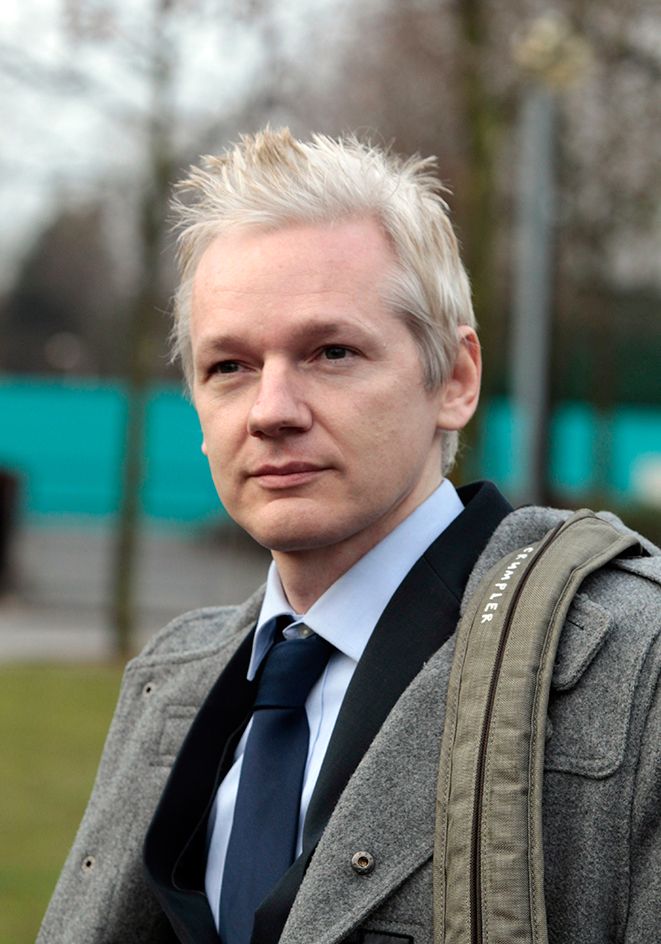Assange, Julian << ah SAHNJ >> (1971-…), is an Australian internet activist and the founder of WikiLeaks. WikiLeaks is an organization that publishes secret government and business information on its website. Assange founded WikiLeaks as an expression of his political ideas. He believes that publishing secrets can force governments and corporations to become more open and just.

Assange was born in Townsville, in Queensland, Australia, on July 3, 1971. He moved frequently as a child and was mostly homeschooled. As a teenager in the late 1980’s, Assange became interested in computers. He learned how to hack into computer networks—that is, gain unauthorized access to them. He and two friends formed a computer-hacking group they called International Subversives. In 1991, after Assange was caught hacking into a computer system, Australian federal police raided his home. He pleaded guilty to the charges and paid a small fine to the Australian government. In the 1990’s, he wrote computer programs, most of them for open-source (free) software.
Assange founded WikiLeaks in 2006. Early leaks published on the organization’s website revealed government corruption (wrongdoing) in Kenya, and United States military policies at a detention camp in Guantánamo Bay, the site of a U.S. naval base in Cuba. In April 2010, Assange and his coworkers posted a video that had been filmed in Iraq in 2007, during the Iraq War (2003-2011). The video showed a U.S. Army helicopter firing on and killing civilians. The controversy that surrounded the video made Assange a public figure.
In July and October 2010, Assange published leaks of logs written by soldiers in Afghanistan and Iraq. Some people praised Assange as a whistleblower—that is, a person who exposes activities they believe are unethical or illegal. Others criticized Assange for these posts. They claimed that publishing the information endangered the lives of Americans serving in the military. They also criticized the posts for endangering local people who helped the U.S. military in war zones. In addition, Assange was suspected of aiding in the computer break-in that resulted in the leaks. Assange claimed the leaks had not led to the deaths of any innocent people.
In late 2010, while Assange was living in the United Kingdom, Swedish authorities issued a warrant for his arrest. He was wanted for questioning regarding a rape claim made against him during a visit to Sweden. Assange denied the accusation, and no formal charges were filed. However, in 2012, the British Supreme Court ruled that Assange should be extradited (handed over) to Sweden for questioning. Assange then jumped bail (failed to appear in court) and sought and was granted asylum (safe shelter) at the embassy of Ecuador in London. Ecuador had no extradition treaty with Sweden.
For nearly seven years, Assange never left the embassy, fearing that should he do so, British authorities would arrest him and turn him over to Sweden. Sweden, in turn, could have extradited him to the United States, where he could face charges for leaking top-secret government documents. During his stay at the embassy, Assange continued to publish millions of secret documents and communications from a number of governments and corporations. In 2016, for example, WikiLeaks published thousands of hacked internal emails linked to the Democratic Party of the United States and the campaign of Democratic presidential nominee Hillary Clinton. Some political analysts believe the leaked emails may have played a role in Clinton’s loss to Donald J. Trump in the 2016 election.
In 2017, Ecuador granted Assange citizenship, with the expectation that he would then leave the embassy and the United Kingdom. However, he stated that he feared arrest and remained at the Ecuadorean embassy. In April 2019, Ecuador revoked (withdrew) its offer of asylum. British authorities took Assange into custody for failing to surrender to a court in the United Kingdom and also for being wanted on a U.S. extradition warrant. In May, a British court sentenced Assange to prison for jumping bail in 2012. Also in May 2019, the U.S. government charged Assange with espionage for publishing classified information on WikiLeaks.
After Assange finished serving his prison term in September 2019, a British judge determined that he was a flight risk. The judge ordered that Assange remain in prison until a hearing could be held regarding the request that he be extradited to the United States. That November, the Swedish government dropped its investigation into the rape claim. In June 2020, the United States issued a new indictment that broadened its charges against Assange. In 2021, a British court refused to allow Assange to be extradited to the United States, but an appeals court overturned the decision later that year. Meanwhile, a judge denied Assange’s request for bail during an additional appeal process, stating that Assange remained a flight risk.
Following a yearslong appeals process, Assange reached a legal agreement with the United States government in June 2024. Under the terms of the agreement, he was first removed from prison in the United Kingdom. He then pleaded guilty in a U.S. federal court to the charge of espionage and was sentenced to time already served in prison. Assange was then released, and he returned to Australia.
